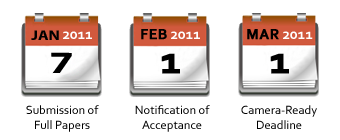

The 1st Workshop on Testing & Debugging (TeBug) aims at bringing together researchers and practitioners in the fields of software testing and debugging.
Papers to be submitted for TeBug should either focus on techniques that are relevant for debugging or describe the application of testing for debugging.
The latter is of special interest for the first edition of the workshop because the influence of testing on debugging and vice-versa has not yet been sufficiently addressed. Other topics of interest include static and dynamic program analysis, monitoring of software, and other debugging techniques such as algorithmic and automated debugging, delta debugging, debugging based on models, debugging using mutations or genetic programming, or debugging using slicing.
For TeBug we are seeking for high quality papers describing original research in the mentioned areas, or tool demonstration papers. Furthermore, we especially welcome industrial experience papers describing either open problems regarding the intersection of testing and debugging or experiences obtained when using debugging tools in practice.
Workshop proceedings will be published in the IEEE Digital Library. For the best papers presented at TeBug, we plan to organize a special issue of a software engineering journal.
Grand Hotel Esplanade Berlin
Lützowufer 15
10785 Berlin, Germany.
For detailed information about TeBug location visit ICST 2011 Website.
General Chairs
Web Chair
Program Committee
 08:00 - 09:00 - Registration
08:00 - 09:00 - Registration
09:00 - 09:05 - Opening remarks
09:05 - 10:00 - Keynote Address by Alex Orso
GeorgiaTech, USA
Automated Debugging: Are We There Yet?
Abstract: Software debugging is a notoriously difficult, extremely time consuming, and human-intensive activity. For this reason, researchers have invested a great deal of effort in developing automated techniques and tools for supporting various debugging tasks. Although potentially useful, most of these techniques have yet to fully demonstrate their practical effectiveness. Moreover, many current debugging approaches suffer from some common limitations. In particular, many techniques rely on a set of strong assumptions on how developers behave when debugging, fail to leverage the rich source of information represented by the user population, and focus mainly on trying to reduce the number of statements to examine, mostly ignoring the importance of identifying relevant inputs. This talk will provide an overview of the state of the art in the area of software debugging, discuss strengths and weaknesses of the main existing techniques, present a set of open challenges in the area of debugging, and sketch future research directions that may help address these challenges.
Bio: Alessandro Orso is an associate professor in the College of Computing at the Georgia Institute of Technology. He received his M.S. degree in Electrical Engineering (1995) and his Ph.D. in Computer Science (1999) from Politecnico di Milano, Italy. From March 2000, he has been at Georgia Tech, first as a research faculty and now as an associate professor. His area of research is software engineering, with emphasis on software testing and analysis. His interests include the development of techniques and tools for improving software reliability, security, and trustworthiness, and the validation of such techniques on real systems. Dr. Orso is a member of the ACM and the IEEE Computer Society.
10:00 - 10:30 - Coffee Break
10:30 - 12:00 - Workshop Session 1
12:00 - 14:00 - Lunch
14:00 - 15:30 - Workshop Session 2
15:30 - 16:00 - Coffee Break
16:00 - 17:00 - Workshop Session 3
Topics of interest for the workshop include (but are not limited to):
Submissions must be clearly marked as research, industrial report, or tool demonstration contribution.
One author of each paper submitted must be committed to attend the workshop and present the paper.
Research papers should be no longer than 10 pages describe a novel contribution to testing and/or debugging and should carefully support claims of novelty with citations to the relevant literature.
Papers that describe an industrial report should be no longer than 4 pages and contain the environment, methodology used, and results or lessons learned.
Tool demonstration papers should be no longer than 4 pages and explain the purpose and implementation of a debugging tool.
All paper categories must conform to the two-column IEEE conference publication format and must be submitted in pdf format.
Submissions will be handled via EasyChair.
Templates:
Promote TeBug 2011 by creating a link to this page on your website.
You can create a link using the following code:
<a href="http://paginas.fe.up.pt/~tebug2011/">
<img style="border: none;" alt="TeBug 2011"
src="http://paginas.fe.up.pt/~tebug2011/tebug_blue.png" />
</a>
These images are transparent, for better integratation into your website.
Thank you for sharing!



